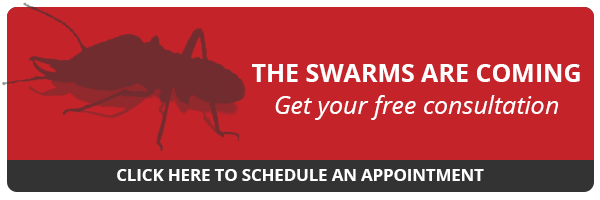Over the past few months we’ve been discussing termites and preventing termite infestations early before they become a problem. Due to warmer climates in the southern United States, termites can remain active all year round, and while they are slightly less active during winter and early spring, they can still present a major problem.
As we move towards the summer months, it’s important to note that late spring and early summer is when termites are most active and when, often times, preventative measures may be futile, as termites may have already taken residence in your home.
How to Spot Termites around Your Home
Over the past few months, we’ve discussed how to prevent and spot termite infestations, and we’ve developed several great resources for identifying possible infestations. In general, the more common signs of a termite infestation are:
- Discarded wings around your home and property
- Mud tubes on walls or substructures
For more information on the signs of termite infestation and what to look for around your home, check out the 5 signs that your home might have a termite infestation.
How to Prevent Termite Infestation
There are many steps that need to be taken to prevent a termite infestation, and this becomes increasingly important as we move into the most active season for termites. While it’s recommended to have your home professionally treated, there are easy steps you can take around your home to discourage termites from building colonies:
- Eliminate termite food sources
- Remove vegetation and brush from your property
- Control excess moisture around your home
For more detailed information on preventing termite infestation, take a look at our 4 Ways to Prepare for Termite Season post.
What to Do if You Think Your Home Has Termites
Termites can cause absolute devastation to your home and the cost of repairing that damage can be many thousands of dollars. In order to properly protect your home, and to identify whether or not your home has a termite infestation, it’s important to work with a professional pest control service that specializes in termite treatment.
A professional pest control service has the detection tools needed to find termites in and around your home, and can quickly diagnose the problem with an onsite visit. They can also recommend a prevention solution that will keep your home protected during the height of termite activity. Should they find signs of a termite infestation on your property during their inspection, they can recommend and deploy a treatment that will help prevent further damage and eliminate the existing infestation.

